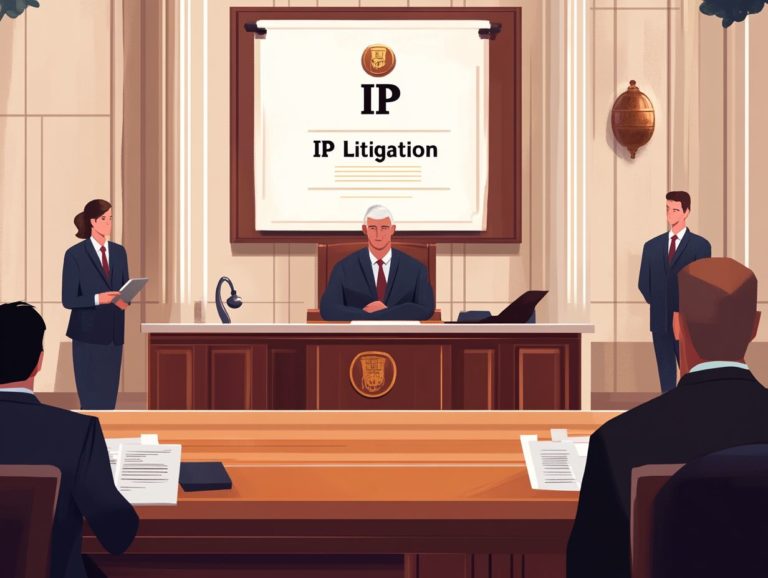5 Ways to Leverage IP Rights in Litigation
In today’s competitive landscape, grasping and utilizing intellectual property (IP) rights is vital for businesses facing litigation. This article lays out essential steps for navigating IP disputes effectively.
Learn to recognize different types of IP and do thorough reviews of your assets. You ll also see the benefits of alternative dispute resolution methods, and how these can prepare you for the possibility of litigation.
With insights on safeguarding your IP rights and maximizing their value, this guide empowers you to transform challenges into opportunities. Explore how to bolster your business s stance in the intricate realm of IP litigation.
Contents
- Key Takeaways:
- 1. Understand the Types of Intellectual Property Rights
- 2. Conduct a Thorough IP Audit
- 3. Identify Potential Infringement
- 4. Consider Alternative Dispute Resolution
- 5. Prepare for Litigation
- What Are the Benefits of Leveraging IP Rights in Litigation?
- What Are the Common Challenges in IP Litigation?
- What Are the Key Factors to Consider When Choosing an IP Litigation Strategy?
- How Can a Business Protect Their IP Rights Before Litigation?
- What Are the Potential Outcomes of IP Litigation?
- How Can a Business Leverage Their IP Rights to Gain a Competitive Advantage?
- Preguntas Frecuentes
- C mo puedo aprovechar mis derechos de propiedad intelectual en demandas?
- Cu les son los beneficios de afirmar mis derechos en la corte?
- Puedo hacer cumplir mis derechos con cartas de cese y desistimiento?
- C mo puede ayudarme licenciar mi propiedad intelectual en demandas?
- Qu debo considerar al comprar o vender activos de propiedad intelectual?
- Puedo usar mi propiedad intelectual como garant a para financiamiento?
Key Takeaways:

- Understand the different types of IP rights to see what applies to your business.
- Do an IP audit to uncover potential infringements and strengthen your case in litigation.
- Consider alternative dispute resolution methods to save time and resources.
1. Understand the Types of Intellectual Property Rights
Understanding the types of intellectual property rights is crucial. This knowledge benefits both businesses and individuals.
These rights include patents, copyrights, trademarks, and trade secrets. They protect your creative works and inventions while fostering economic growth and innovation.
For instance, patents shield your inventions, granting you exclusive rights for a set time. Copyrights protect original works, like music or software, allowing you to monetize your creations.
Trademarks distinguish your goods or services, enhancing brand recognition. Meanwhile, trade secrets keep valuable business information confidential, giving you a competitive edge.
Leverage these rights to boost profitability and contribute to job creation in a vibrant economy.
2. Conduct a Thorough IP Audit
Doing a thorough IP audit is essential for assessing your intellectual property assets. This review ensures compliance with legal requirements.
The audit involves analyzing your patents, trademarks, copyrights, and trade secrets. Identify potential risks and opportunities to safeguard your innovations.
Keeping a comprehensive knowledge database helps you proactively monitor your IP assets. This also aids in spotting possible infringements early.
Take this strategic approach now to protect your assets and thrive in the market!
3. Identify Potential Infringement
Identifying potential infringement is vital for protecting your intellectual property rights. This helps you craft effective legal strategies.
Regularly monitor public patents and technological advancements to spot emerging threats. Set up automated alerts to flag any activities that might infringe on your IP.
This vigilant approach mitigates risks and strengthens client relationships. Clients appreciate knowing their interests are actively protected.
Use data analytics tools to predict trends. This allows you to stay one step ahead of potential challengers.
4. Consider Alternative Dispute Resolution

Considering alternative dispute resolution (ADR) methods opens up a valuable path for you to resolve intellectual property disputes more efficiently than traditional litigation. These methods provide tailored legal strategies that enhance your client services and preserve vital business relationships.
IP issues are complex. Methods like mediation and arbitration are essential. Mediation opens the door for meaningful conversations, helping both sides find common ground without the adversarial tension of court.
On the flip side, arbitration is a process where an impartial person makes a decision to resolve the dispute, significantly speeding up the entire process.
A software company settled its patent dispute through mediation, saving them costly litigation and protecting their market reputation. Numerous case studies highlight the effectiveness of ADR.
The confidentiality inherent in ADR processes protects sensitive information from public exposure, making it an attractive option for businesses eager to shield their proprietary assets.
5. Prepare for Litigation
Prepare for litigation now! Meticulous planning is key to your success. Ensure you secure strong attorney representation while fully grasping your legal rights and compliance measures related to intellectual property. For more detailed guidance, check out how to conduct a successful IP litigation trial.
Start by collecting all relevant evidence, like documents and communications, to strengthen your case. Consulting with experienced patent attorneys early in the process is vital; their expertise can illuminate potential legal strategies you might not have considered.
You must also be well-versed in disclosure requirements. Understanding what information needs to be shared with opposing parties is crucial to sidestepping pitfalls during litigation. By adopting a strategic approach, you streamline the organization of necessary materials and enhance your chances of achieving a favorable outcome, demonstrating your business’s readiness and resilience in the courtroom.
What Are the Benefits of Leveraging IP Rights in Litigation?
Wondering how to protect your innovations? Leveraging intellectual property rights in litigation can be crucial. Here are 5 ways to strengthen your IP case before litigation that can provide a wealth of benefits:
- Unlocking new business opportunities
- Enhancing client success with effective legal strategies
- Contributing to economic growth in the competitive technology sector
By strategically utilizing IP rights, you can fortify your market position, distinguishing yourself from competitors while protecting your innovations. To learn more about protecting your interests, check out this guide on how to handle IP litigation as a plaintiff. Safeguarding against infringement not only reduces risks but also paves the way for significant financial gains.
For instance, companies that have successfully pursued litigation against IP theft often experience notable surges in stock prices and heightened consumer trust. A prime example is the Apple vs. Samsung trial, where favorable outcomes for Apple resulted in a substantial increase in their market valuation, demonstrating how strategic enforcement of IP can translate into measurable business success.
What Are the Common Challenges in IP Litigation?
Navigating the complexities of IP litigation can be quite the endeavor. You’ll wrestle with intricate legal strategies and manage client relationships amidst disputes, all while keeping pace with rapid technological advancements that could sway case outcomes. To succeed, consider exploring how to develop a winning IP litigation strategy.
Many businesses face the staggering costs associated with expert testimonies and legal fees, which can escalate faster than anticipated. The protracted nature of litigation can tie up valuable resources, stalling innovation and hampering overall productivity.
Adding to this challenge is the weight of public scrutiny, especially when brand reputation hangs in the balance. To effectively navigate these hurdles, invest in proactive strategic planning. Conduct comprehensive IP audits and develop robust risk management frameworks to handle potential disputes more adeptly.
What Are the Key Factors to Consider When Choosing an IP Litigation Strategy?

When forming your IP litigation strategy, consider the nature of the infringement and its impact on client services. For comprehensive guidance, learn how to protect your IP rights during litigation. Identifying risks is crucial for an effective approach.
Tailor your strategies to fit each case’s unique circumstances. Budget constraints often influence your actions, so navigate financial limitations wisely.
Desired outcomes also shape your strategy. Know if you re focusing on quick resolutions or long-term protection.
Explore potential settlements or alternative dispute resolutions. These can lead to beneficial outcomes and save time and costs.
How Can a Business Protect Their IP Rights Before Litigation?
Safeguard your IP rights by implementing strong business strategies. This includes compliance measures and monitoring your patent portfolio.
Regular IP audits are key to spotting vulnerabilities. Ensure your assets are well protected.
Equip employees with training to recognize potential infringements. Awareness among staff serves as your first line of defense.
Establish reporting protocols for suspicious activities. This encourages a vigilant culture within your organization.
Build strong relationships with legal professionals. They provide tailored guidance and keep you compliant, ready for any challenges.
What Are the Potential Outcomes of IP Litigation?
IP litigation outcomes can vary widely. You may receive favorable rulings that uphold your rights or face financial repercussions, which is why understanding IP litigation strategies for patent holders is crucial.
The stakes include injunctions limiting business practices or product launches. This can impact your operations significantly.
Set clear objectives from the start to stay focused. Realistic expectations help you navigate the complexities of disputes.
By doing this, you will weigh the potential benefits and risks. This helps in developing strategies for long-term growth.
How Can a Business Leverage Their IP Rights to Gain a Competitive Advantage?
Use your intellectual property (IP) rights to gain a competitive edge. To effectively navigate this area, learn how to prepare for an IP litigation case while nurturing innovation and elevating brand recognition through effective management.
Consider licensing agreements to monetize your patents or trademarks while keeping ownership. For example, a tech firm can license software to startups, expanding its reach.
Brand partnerships can significantly enhance visibility. Collaborations, like Coca-Cola s with entertainment franchises, boost brand awareness.
Run effective marketing campaigns that highlight your offerings. A fashion label showcasing exclusive designs can generate buzz and increase sales.
Preguntas Frecuentes

C mo puedo aprovechar mis derechos de propiedad intelectual en demandas?
- Afirmar tu patente, marca registrada o derecho de autor en la corte.
- Hacer cumplir tus derechos a trav s de cartas de cese y desistimiento.
- Licenciar tu propiedad intelectual a otros para su uso.
- Comprar o vender activos de propiedad intelectual.
- Usar la propiedad intelectual como garant a para obtener financiamiento.
Cu les son los beneficios de afirmar mis derechos en la corte?
Al afirmar tus derechos en la corte, puedes proteger tus ideas y evitar que otros las usen sin tu permiso. Esto puede resultar en compensaciones monetarias y rdenes que detengan actividades infractoras.
Puedo hacer cumplir mis derechos con cartas de cese y desistimiento?
S , las cartas de cese y desistimiento ayudan a hacer cumplir tus derechos. Estas cartas informan a la otra parte sobre la infracci n y les piden que dejen de usar tu propiedad intelectual.
C mo puede ayudarme licenciar mi propiedad intelectual en demandas?
Licenciar tu propiedad intelectual te permite ganar dinero y fortalecer tu caso. Al dar permiso a otros para usar tus ideas, puedes recibir regal as y aprovechar su experiencia legal.
Qu debo considerar al comprar o vender activos de propiedad intelectual?
Es crucial hacer una revisi n cuidadosa para asegurar el valor de la propiedad intelectual. Tambi n, revisa los contratos para proteger tus derechos y minimizar riesgos.
Puedo usar mi propiedad intelectual como garant a para financiamiento?
S , puedes usarla como garant a para financiar tus demandas. Esto ayuda a cubrir costos legales y otros gastos, pero revisa bien los t rminos del acuerdo antes de usar tu propiedad.






